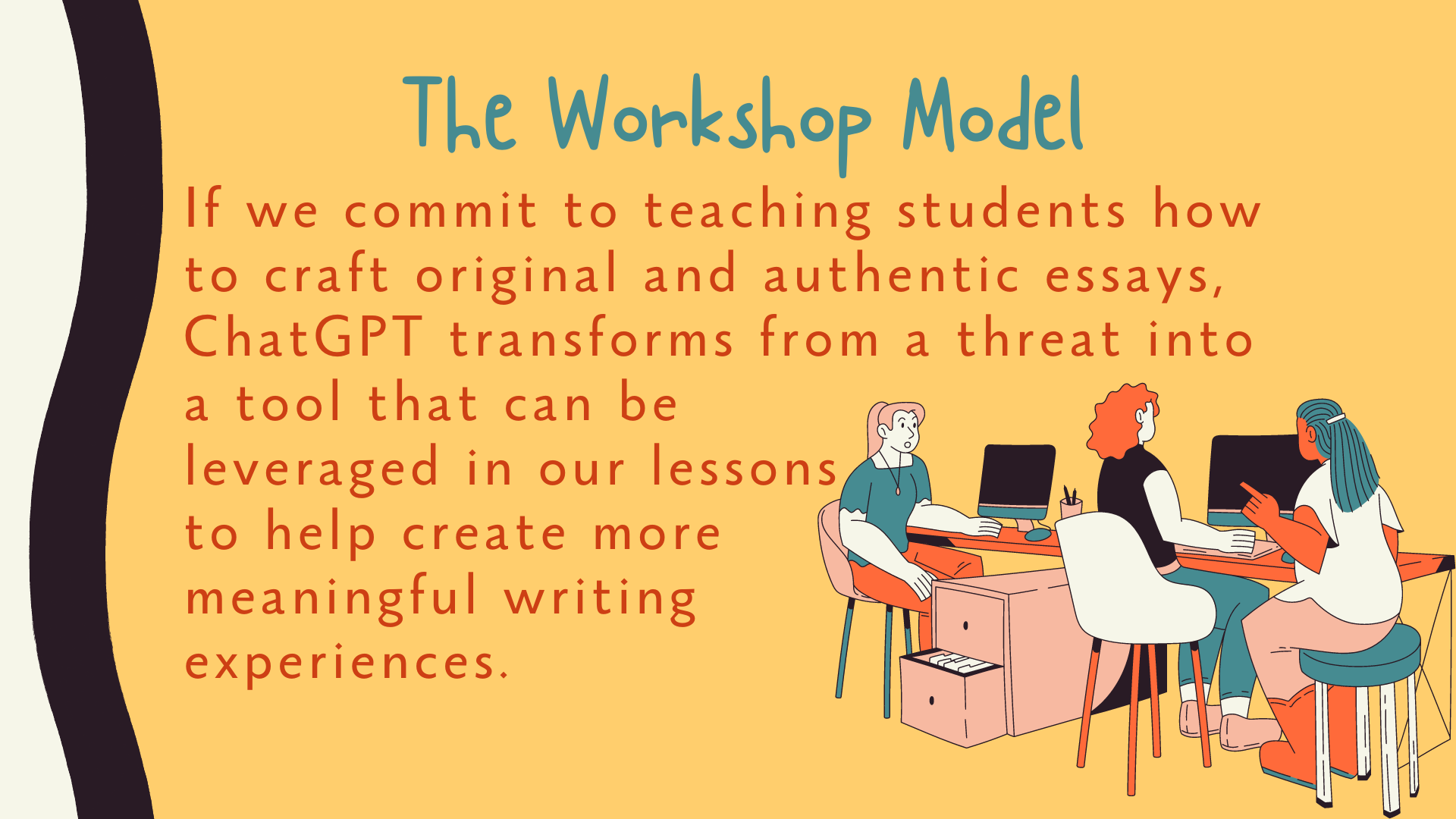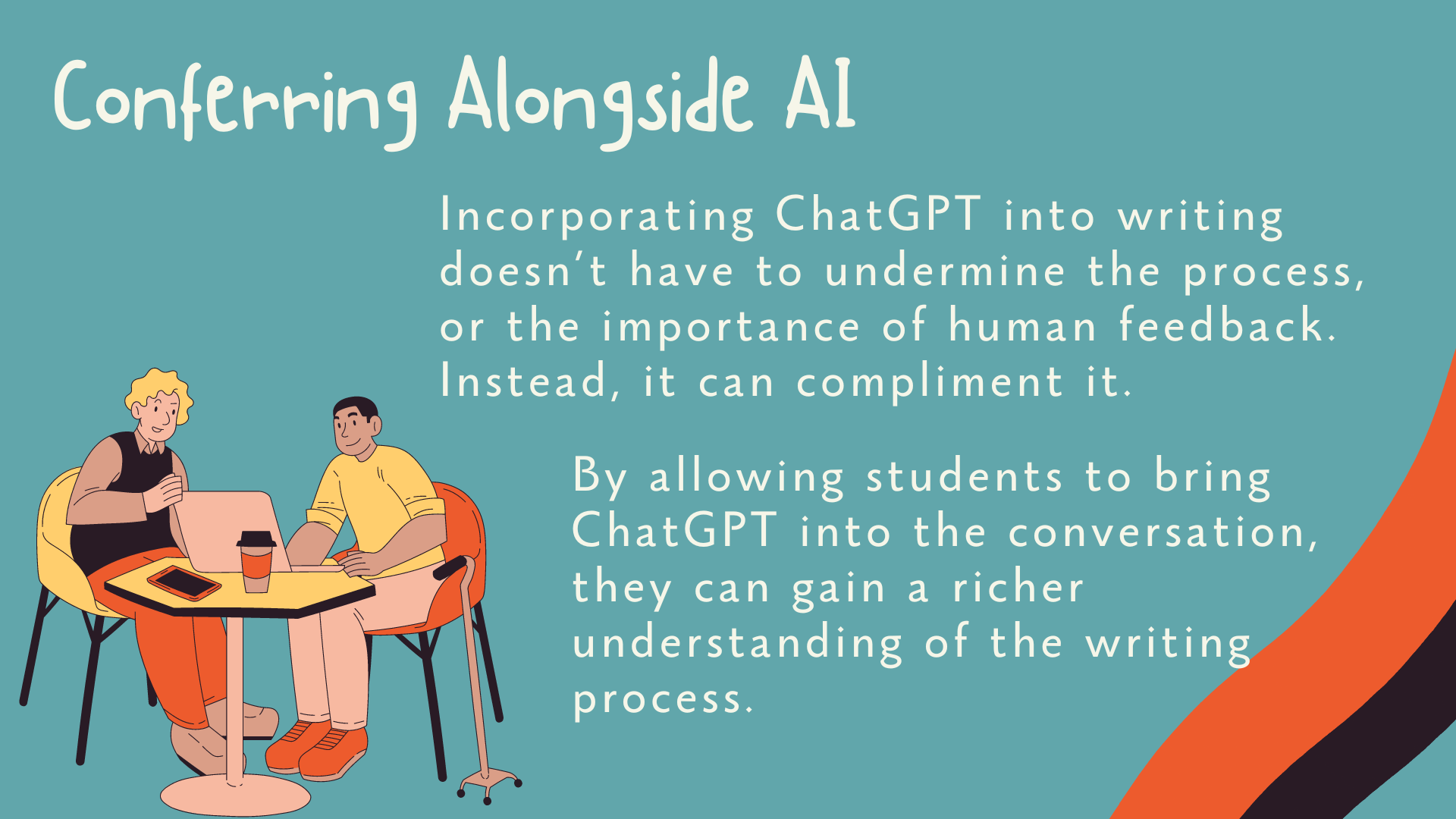
By Dennis Magliozzi and Kristina Peterson. This is the final part of the series. See part one here and part two here.
***
Early responses to combating the AI threat in our classrooms included suggestions like asking our students to get more personal in their writing, or going back to timed writing exercises with pen and paper. And while those suggestions may work to a certain extent, they assume bad intent on our students’ part in the first place and they leave students uneducated about AI in the second. A large part of our job as English teachers is to teach students to write. Writing well is more than simply conveying information; it's about learning how to think critically, creatively, and analytically. It's about understanding the nuances of language and developing a unique voice. But, too often, writing is reduced to a formulaic exercise, one that can be outsourced and assembled all too easily with the help of ChatGPT.
The Workshop Model
 Workshop-style classrooms embrace a mindset that all of the lessons and learning tasks are designed to help students become lifelong readers, writers, and thinkers. This perspective is crucial when considering the role of generative AI in education. If our goal as educators is to simply dispense information for students to memorize and echo back, then ChatGPT poses a significant threat. However, if we commit to teaching students how to craft original and authentic essays, ChatGPT transforms from a threat into a tool that can be leveraged in our lessons to help create more meaningful writing experiences.
Workshop-style classrooms embrace a mindset that all of the lessons and learning tasks are designed to help students become lifelong readers, writers, and thinkers. This perspective is crucial when considering the role of generative AI in education. If our goal as educators is to simply dispense information for students to memorize and echo back, then ChatGPT poses a significant threat. However, if we commit to teaching students how to craft original and authentic essays, ChatGPT transforms from a threat into a tool that can be leveraged in our lessons to help create more meaningful writing experiences.
The workshop model is a pedagogical method where teachers model the writing process for students rather than simply deliver information. The teacher writes alongside their students and approaches each piece of writing as something to be authored instead of assembled. When we model ownership over the writing, we can shift our view of a program like ChatGPT from a threat that helps students cheat (assemble an essay) to a tool that can help students write (author an essay).
Conferring Alongside AI

We need to take the time, especially in the era of AI, to write next to and confer with our students throughout the writing process. This is the most effective way to teach students how to write on their own. Further into the process, we can model how to ethically integrate a program like ChatGPT into their writing. Once students have at least a rough draft in hand, we start to confer. Conferring offers a powerful opportunity to connect to our students and their writing. It is a time when we can observe our students as writers, crafting the early draft of their work before AI chimes in. While AI and tools like ChatGPT can generate text, it cannot replicate the authentic voice, the unique perspectives or individual experiences that students bring to their writing. It can, however, act as an aide to the writing process.
Incorporating ChatGPT into writing doesn’t have to undermine the process, or the importance of human feedback. Instead, it can compliment it. Why can’t we teach students to use programs like ChatGPT as an ally for brainstorming ideas and feedback while they author their written work? While there are many issues with using ChatGPT to assemble and submit writing, using it as an aid in authoring writing isn’t one of them. By allowing students to bring ChatGPT into the conversation, they can gain a richer understanding of the writing process. As with every tool, the key is to teach students how to use it ethically. ChatGPT isn’t a crutch for writing; instead we can teach students to use it as a catalyst, driving each of us toward the ‘write’ balance.
Note: Any teacher considering the use of AI with their students needs to pay close attention to their state and district recommendations and guidelines.



Kristina Peterson and Dennis Magliozzi have been teaching English at Exeter High School since 2008. Kristina has a master’s degree in teaching and over a decade of experience mentoring teachers. Dennis holds an MFA in poetry and a PhD in Curriculum and Instruction. Together they co-teach in the University of New Hampshire’s Writers Academy and Learning Through Teaching program. They are also Ambassadors to the award-winning Arts in Action program, and the cofounders of Bookshelf Diversity, a statewide grant project that provides diverse books to New Hampshire classrooms. Their work on generative AI’s impact in the classroom is part of a three-part series, setting the stage for their forthcoming book which is currently slated for a spring 2025 release.
Related Reading

Presented by Dennis Magliozzi & Kristina Peterson


